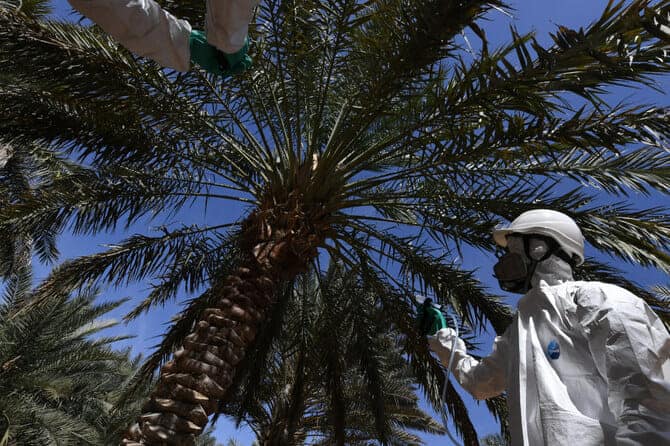Owing to an arid climate, the UAE will never be self-sufficient in terms of food production. Even the United Kingdom, a historically agrarian nation that employs 70 percent of its total land area for agriculture, imports 48 percent of its food to feed its population.
The UAE’s key to resolving the issue lies in investing in cutting-edge agricultural technologies such as vertical farming, hydroponics, bioengineering, which will greatly improve its food security in the event of global disruptions, according to Chaddy Kirbaj, Vice Director of Swissquote Bank Dubai.
Kirbaj told TRENDS that the global investment in Agritech has boomed in recent years, and this is reflected in the UAE also, where both the public and private sectors are leading the effort to move toward the future of agriculture.
Today’s agritech is versatile
Agritech doesn’t just mean agricultural machinery like combine harvesters. Today the term can refer to a range of products and services, from heavy machinery or genetically modified crops to sophisticated technologies such as AI-controlled hydroponic irrigation and UV lighting systems for vertical farming. It could include soil management systems, satellite-guided weather forecasts, or even agricultural drones used to monitor crop yields and improve farm efficiency.
In the agricultural industry, technology has resulted in a significant reduction in the workforce required to produce equivalent crop yields. For example, a thousand-acre field that would have taken hundreds of farmhands a week to harvest physically can now be managed in a single day by huge combine harvesters.
Furthermore, the tremendous increase in agricultural productivity generated an equivalent rise in the number of people it could support, resulting in a corresponding expansion in economic activity throughout all sectors of the economy. This demonstrates how technology affects an economy to some extent.
Mechanized technology such as tractors and combine harvesters, the first types of Agritech, have helped humans substantially boost productivity, efficiency, and profitability in farming since the industrialization of agriculture in the early twentieth century.
However, as the global population grows at a rate of 80 million people each year, the demands on the planet’s natural resources to feed it become increasingly severe. Soil deterioration, deforestation, and biodiversity loss are all severe risks to humanity’s long-term sustainability.
In today’s heavily globalized world, any significant disruption to international food supply chains can cause famine, mass migration, and even armed conflict. Fortunately, significant advances in domains like ITC, AI, automation, and genetics are increasingly being applied to agricultural technology, to address these challenges.
UAE’s promising initiatives
Over 100 entities use organic farming techniques in the UAE, including advanced farms that utilise modern agricultural technologies. The Abu Dhabi Investment Office (ADIO) is investing at least US$100m in agritech startups as part of their food security strategy.
Through initiatives like these, the UAE aspires to be among the top 10 countries in the world for food security soon, compared to its current position of roughly 21st globally. These initiatives offer considerable opportunities for commodities investors betting on current consumer habits, with a strong potential for impressive returns.
On the other side, Sheikh Mohammed bin Rashid Al Maktoum, Vice President, Prime Minister and Ruler of Dubai, in May 2021 launched the Food Tech Valley project in Dubai, a partnership between the Ministry of Food and Water Security and Wasl Properties to explore urban planning of future smart and food-independent cities. It will centre around four main clusters, based on agricultural technology and engineering, a food innovation centre, R&D facilities, and an advanced smart food logistics hub.
The agricultural technology and engineering cluster will include a vertical farm that employs the latest food technologies to grow vital crops around the year and will focus on developing innovative projects in bioengineering, automation, robotics, and artificial intelligence.
One company in the UAE has already started using high-tech vertical farming techniques to produce up to 8,000 kg of produce per cycle, and additional start-ups are expected to follow suit soon, thanks to strong government supported by strong government investment.
Countries like the UAE, according to Kirbaj, are increasingly investing in advanced Agritech to reduce their dependency on global supply chains and improve their domestic food security.
Furthermore, the enormous supply chain disruptions created by the COVID-19 pandemic have accelerated the digitization of traditional agricultural instruments. We should expect an increase in domestic initiatives to enhance agricultural efficiency and attract investment as agricultural commodity prices rise.








